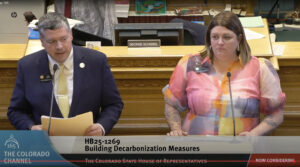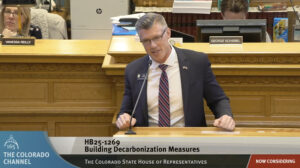Months of negotiations have resulted in what business leaders called a mutually beneficial agreement with state regulators on how to proceed with commercial-building decarbonization efforts — an agreement that led to passage of a key bill this week.
The feeling in the industry is much better than it was two-and-a-half months ago, when legislators introduced a supposed decarbonization-aid bill before sector leaders could see a final draft and offer suggestions. So, while House Bill 1269 was meant to help building owners comply with emissions-reduction goals established in 2023, the industry shot back that it made things harder for it in many ways — particularly financially — and sought a slew of changes.
Those changes finally arrived Tuesday, when sponsoring Democratic Reps. Jenny Willford of Northglenn and Alex Valdez of Denver passed eight amendments that lowered potential penalties against building owners and gave them more voice over future regulations. Most Republicans still objected to the plan — only House Minority Leader Rose Pugliese backed HB 1269 as it passed on a largely party-line 42-21 vote Wednesday — but an industry group said it’s now done fighting regulations and ready to get on with upgrading structures.

Colorado state Reps. Alex Valdez and Jenny Willford describe their bill on commercial building decarbonization to the House on Tuesday.
“We were able to negotiate everything we wanted,” said Stephen Shepard, chief staff officer for the Denver Building Owners and Managers Association, in an interview. “I honestly think we would have been able to kill the bill on the floor, but we needed some of the things in this bill.”
Why commercial building owners demanded changes
The 2023 rules approved by the Colorado Air Quality Control Commission required owners of commercial buildings of at least 50,000 square feet — about 8,300 structures statewide, including apartment buildings — to cut emissions 7% by 2026 and 20% by 2030. The rules are part of cross-sector emissions-reduction efforts in which the state has established new mandates for targets ranging from oil-and-gas pipeline operators to large manufacturing plants to gas-powered lawn-and-garden equipment.
Because of the time and resources required to plan for building efficiencies and major HVAC system upgrades, industry leaders called the 2026 deadline impossible. They said they needed both regulatory leniency and planning help from state officials unless they wanted to see the program devolve into noncompliance and massive fines.
HB 1269 offered a big regulatory give as introduced, agreeing to eliminate the 2026 mandates so that building owners could concentrate on meeting the larger 2030 goals. But the bill also proposed to mandate new goals in 2040, established fines that could be as high as $47,500 a day by 2030 and offered help only through a proposed new enterprise into which building owners must pay $400 each year.

Buildings like these in downtown Denver could be impacted by emissions-reduction mandates.
What the changes do
After a month-and-a-half of new discussions, the two sides agreed on amendments, including changes to HB 1269 that would:
- Establish maximum fines of $577 for first-time offenders and $2,300 for subsequent offenders for failing to benchmark energy usage, followed by maximum fines of $2,300 and $5,800 per 30 days for first-time and subsequent failures to meet performance standards;
- Clarify that buildings could set their emissions reductions against benchmarks from 2019 rather than 2021, allowing them to mark emissions cuts from a pre-pandemic time when vacancies were lower and energy usage was much higher;
- Give business leaders two more seats on the task force that will have a big hand in designing the 2040 decarbonization standards — one for representatives of mixed-use commercial office space and the other representing hospitals or healthcare facilities;
- Bar the Building Decarbonization Enterprise Board from raising its $400 yearly fee by any annual amount greater than the rate of inflation;
- Clarify that building owners can ask enterprise leaders and officials in the Colorado Energy Office what they can do to reach their prescribed emissions-reduction goals; and,
- Require that all rules adopted by the AQCC to be technically feasible and economically reasonable.
A “commitment” to commercial building owners
“What it does is makes a program better that was already good,” Valdez said. “But it’s also a commitment on our part to the sector.”
Shepard acknowledged that the upgrades needed by buildings still will be costly, and the emissions-reduction goals won’t necessarily be easy to meet. But the amendments, particularly those allowing for more dialogue with the CEO, help to change the dynamic with state government, and the bill requires the state to do an analysis on the economic impacts of its rules before it proposes them, he said.
Even after the changes, Republicans fought HB 1269, saying the 2021 emissions-reduction law that led to the 2023 regulations will still boost costs on building owners significantly, even as many are struggling and going into foreclosure because of increasing vacancy. In that sense, legislators said, buildings will have to raise costs for tenants and exacerbate the existing affordability crisis in the state, and the best thing would be repealing the 2021 law.
Critics: Rules do nothing to make things more affordable

Colorado state Rep. Dan Woog speaks against the bill impacting emissions cuts to commercial buildings.
“Even with those amendments that maybe make the bill less bad, there’s still an element of decarbonization. Therefore, there’s going to be cost,” said Rep. Dan Woog, R-Erie. “Building owners are not taking on those costs. Therefore, they will be passed down to tenants.”
A Republican amendment to repeal the 2021 law, however, died along what appeared to be a party-line voice vote.
HB 1269 now moves onto the Senate, where it is scheduled for its first hearing before the Senate Finance Committee at 2 p.m. Tuesday. The legislative session must adjourn no later than May 7.
